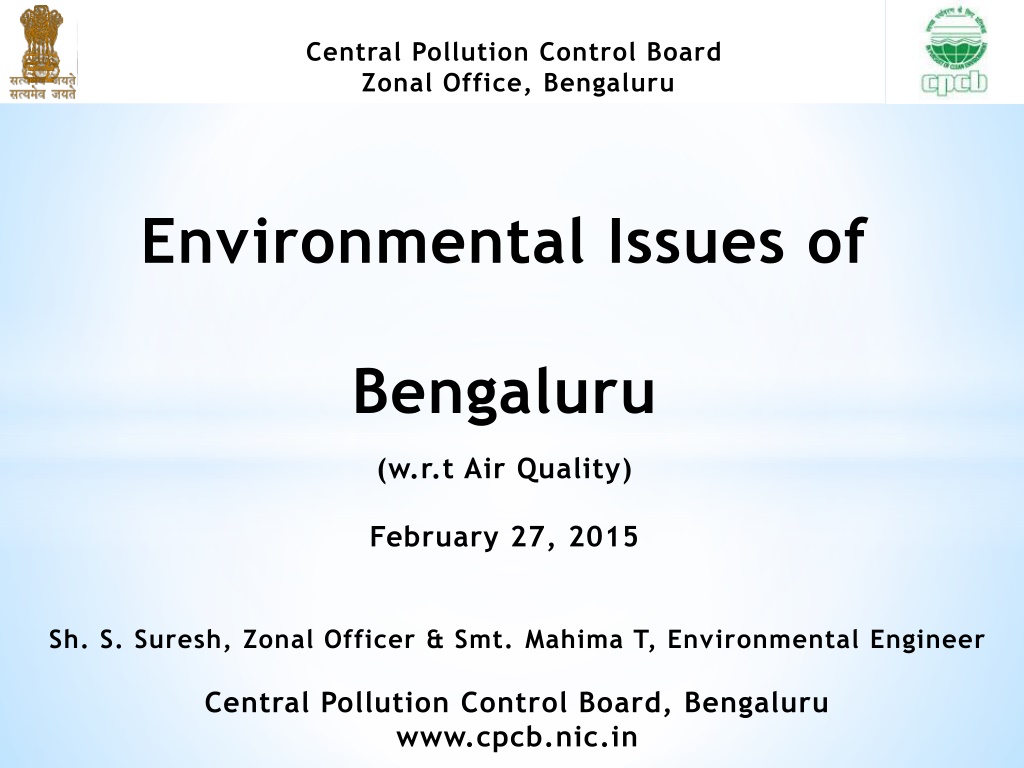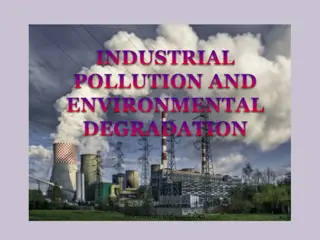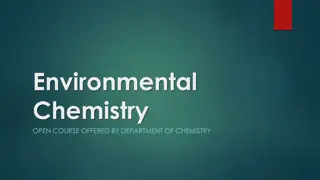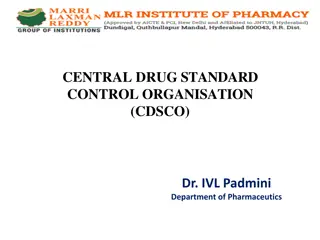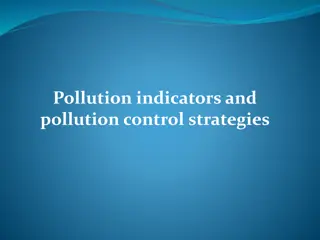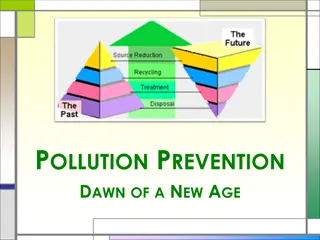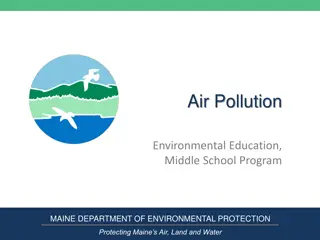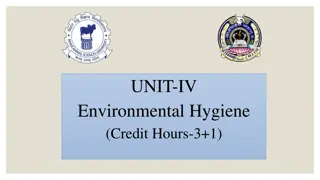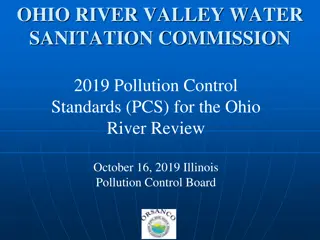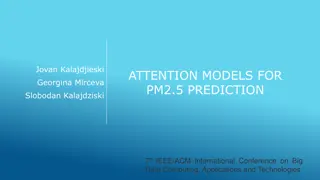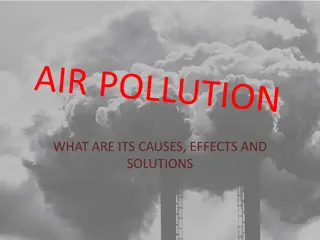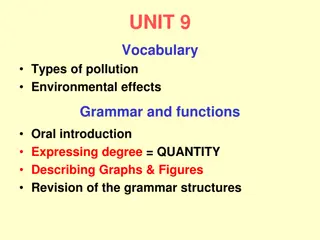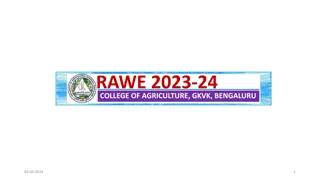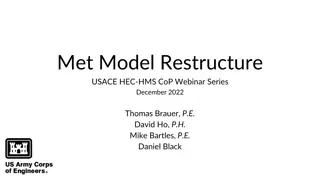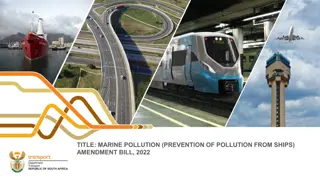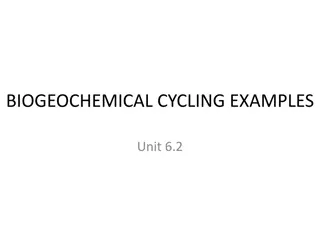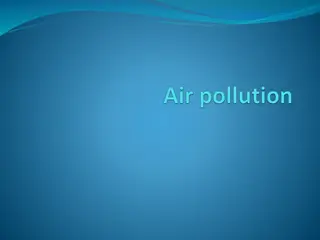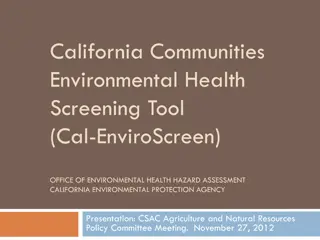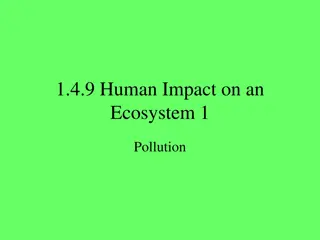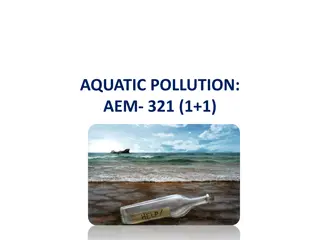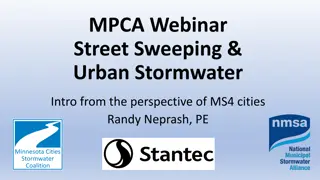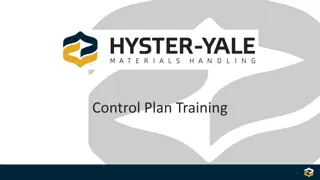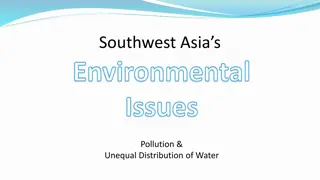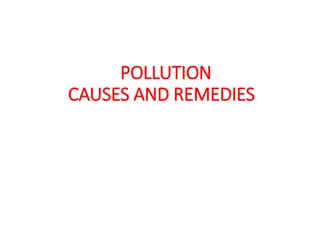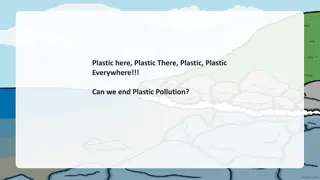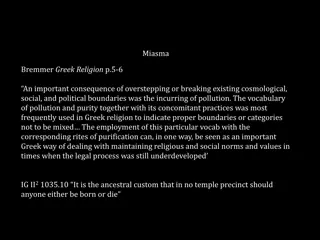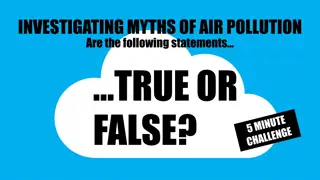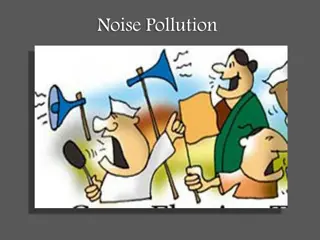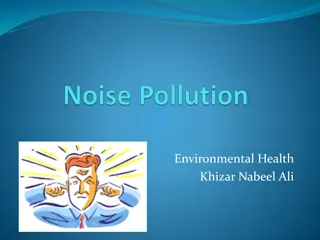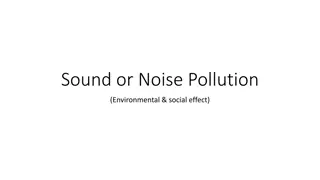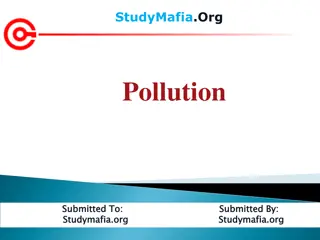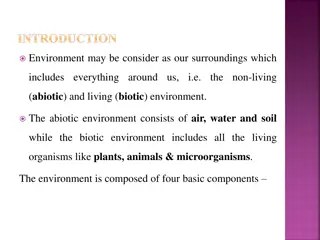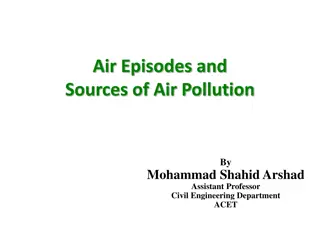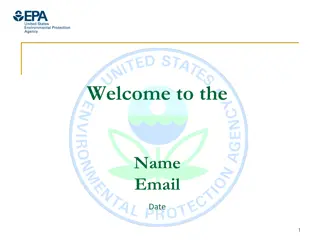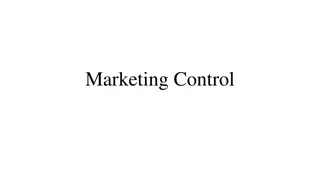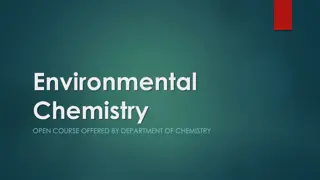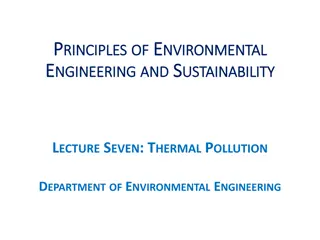Environmental Issues in Bengaluru: Insights from Central Pollution Control Board Zonal Office
Central Pollution Control Board's Zonal Office in Bengaluru highlights key environmental issues related to air quality in the city. The office conducts various activities such as surveillance of air and water quality monitoring stations, inspection of industries, interstate river monitoring, awareness programs, and coordination with pollution control bodies. Bengaluru faces challenges like high population density, industrial growth, vehicular emissions, and limited green cover, impacting the overall air quality.
Uploaded on Sep 22, 2024 | 0 Views
Download Presentation

Please find below an Image/Link to download the presentation.
The content on the website is provided AS IS for your information and personal use only. It may not be sold, licensed, or shared on other websites without obtaining consent from the author. Download presentation by click this link. If you encounter any issues during the download, it is possible that the publisher has removed the file from their server.
E N D
Presentation Transcript
Central Pollution Control Board Zonal Office, Bengaluru Environmental Issues of Bengaluru (w.r.t Air Quality) February 27, 2015 Sh. S. Suresh, Zonal Officer & Smt. Mahima T, Environmental Engineer Central Pollution Control Board, Bengaluru www.cpcb.nic.in
Central Pollution Control Board Zonal Office, Bengaluru Central Pollution Control Board *Statutory organisation under MoEF *Constituted in September, 1974 *Apex body for pollution control in India *Head office in Delhi, with seven zonal offices *Advise the Central Government on any matter concerning prevention and control of water and air pollution and improvement of the quality of air. *Execution of nation-wide programs for the prevention, control or abatement of water and air pollution; *Dissemination of Information
Central Pollution Control Board Zonal Office, Bengaluru About South Zonal Office, Bengaluru *Estd October 1988 * Jurisdiction of Karnataka, Tamil Nadu, Kerala, Andhra Pradesh, Telangana & Goa, Pondicherry and Lakshadweep *Covers area 639474 Sq km and coastal stretch of 3025 km.
Central Pollution Control Board Zonal Office, Bengaluru Important activities *Surveillance of air and water quality monitoring stations *Inspection of industries under ESS *Interstate river monitoring *Organisation of Mass awareness programme * Inspection of laboratories for recognition *Co-ordination with all concerned SPCB s/PCC s/ organizations engaged in Pollution Control Activities *Review of critically polluted areas *Monitoring of STP s, CETP s, TSDF, HCE s, CBMWTF s,
Central Pollution Control Board Zonal Office, Bengaluru Environmental Issues in Bengaluru
Central Pollution Control Board Zonal Office, Bengaluru Bengaluru *Area 741 Sqkm *population of about 8.42 million *Population density per sqkm 11371 *residential areas around 40.4%, industrial-6.9%, commercial-2.7, Transport/ roads- 24.3%, green cover 21.5, others 4.2% *Around 270 large and medium scale industries and around 70,000 SSI *Consumption/capita/year *Lpg-30kg, diesel-57.9 liter, petrol-39.4liter *Vehicle Population in Bengaluru City (up to 30-11-2014) Two wheelers LMV A/R HTV HGV Others Total 3725435 110297 146481 112914 72442 232598 5392847
Central Pollution Control Board Zonal Office, Bengaluru Air quality status?
Central Pollution Control Board Zonal Office, Bengaluru
Central Pollution Control Board Zonal Office, Bengaluru *Unique topographical terrains *North Bengaluru is having flat terrains *South Bengaluru uneven landscape with intermingling hills and valleys *average elevation of 900m *Road length- 11,000 km *Weak/No- Public suburban rail/metro transport seats *Public bus transport/1000 population-35, para-public-352
Central Pollution Control Board Zonal Office, Bengaluru
Central Pollution Control Board Zonal Office, Bengaluru Other reasons * * Uncontrolled growth of vehicular population Type of vehicles on road (predominant old vehicles, Bharat Stage II vehicles, 2W / 3W) Fuel quality issues Fuel adulteration issues Air pollution from SSI units (brick kiln, stone crusher, hotmix plants etc.) Large number of DG Sets (small power generating set run on liquid fuel) * * * *
Central Pollution Control Board Zonal Office, Bengaluru Lung - the main entry point of air pollutants, and the target organ is the alveolus. (There are 300 million alveoli in human lungs) 10,000 15,000 litres air enters every day in an adult lung. Increase in the concentration of pollutants cause parallel increase in the toxic insult to the lungs From the alveolus, pollutants travel via lymph or blood to different organs. Route of Invasion
Central Pollution Control Board Zonal Office, Bengaluru
Central Pollution Control Board Zonal Office, Bengaluru Important Provision of Air Act, 1981 Important Provision of Air Act, 1981 Function of Central Board under section 16(2) (a) Advice the central government on any matter concerning the improvement of the quality of air and the prevention, control or abatement of air pollution, Plan and cause to be executed a nation vide programme for the prevention, control or abatement of air pollution; Co-ordinate the activities of the State and resolve disputed among them; Provide technical assistance and guidance to the State Boards, carry out and sponsor investigations and research relating to problems of air pollution and prevention, control or abatement of air pollution; Plan and organise the training of persons engaged or to be engaged in programmes for the prevention, control or abatement of air pollution on such terms and conditions as the Central Board may specify; (b) (c) (d) (e)
Central Pollution Control Board Zonal Office, Bengaluru (f) organise through mass media a comprehensive programme regarding the prevention, control or abatement of air pollution; (g) collect, compile and publish technical and statistical data relating to air pollution and the measures devised for its effective prevention, control or abatement and prepare manuals, codes or guides relating to prevention, control or abatement of air pollution; (h) lay down standards for the quality of air; (i) collect and disseminate information in respect of matters relating to air pollution; (j) perform such other functions as may be prescribed
Central Pollution Control Board Zonal Office, Bengaluru Function of State Pollution Control Boards under section 17(1) (a) To plan a comprehensive programme for the prevention control or abatement of air pollution and to secure the execution thereof; (b) To advice the state government on any matter concerning the prevention control or abatement of air pollution; (c) To collect and disseminate information relating to air pollution; (d) To collaborate with central board in organising the training of persons engaged or to be engaged in programmes relating to prevention, control or abatement of air pollution and to organise mass education programme relating thereto; (e) To inspect, at all reasonable times, any control equipment, industrial plant or manufacturing process and to give, by order, such direction to such person as it may consider necessary to take step for the prevention, control or abatement of air pollution;
Central Pollution Control Board Zonal Office, Bengaluru (f) To inspect air pollution control areas at such intervals as it may think necessary, assess the quality therein and take steps for the prevention, control or abatement of air pollution in such areas To lay down in consultation with Central Board and having regard to the standards for the quality of air laid down by the Central Boards, standards for the emission of air pollution into the atmosphere from industrial plants and automobiles or for the discharge of any air pollutants into the atmosphere from any other source whatsoever not being a ship or an aircraft; provided the different standards for emission may be laid down under the clause for different industrial plants having regard to the quantity and composition of emission of air pollutants into the atmosphere from such industrial plants; To advice the state government with respect to the suitability of any premises or location for carrying on any industry which is likely to cause air pollution; To perform such other functions as may be prescribed by the central board or the state government; (g) (h) (i)
Central Pollution Control Board Zonal Office, Bengaluru Section 18 of Air Act Section 18 of Air Act Power to give directions directions Power to give 1. In the performance of its function under this act (a) The central board shall be bound by such directions in writing as the central government may give to it; and (b) Every state board shall be bound by such direction in writing as the central board or the state government may give to it; Section 19 Power to declare air pollution control areas The State Government may, after consultation with the State Board, by notification in official gazette declared in such manner as may be prescribed, any area or areas within the State as air pollution control area or areas for the purposes of this act.
Central Pollution Control Board Zonal Office, Bengaluru Section 31 (A) of Air Act Section 31 (A) of Air Act Power to give directions give directions Power to 1. Notwithstanding anything contained in any other law, but subject to the provsions of this Act, and to any directions that Central Government may give in this behalf, a Board may, in the exercise of its powers and performance of its functioning under this Act, issue any directions in writing to any person, officer or authority, and such person, officers or authority shall be bound to comply with such directions. Explanation : for the avoidance of doubts, it is hereby declared that the power to issue directions under this section, includes the power to direct (a) The closure, prohibition or regulation of any industry, operation or process ; or (b) The stoppage or regulation of supply of electricity, water or any other service.
Central Pollution Control Board Zonal Office, Bengaluru AMBIENT AIR QUALITY STANDARDS AMBIENT AIR QUALITY STANDARDS 2009 2009 S.No. Pollutant Time Weighted Average Concentration in Ambient Air Methods of Measurement Remarks Industrial, Residenti al, Rural and Other Area Ecologically Sensitive Area (notified by Central Government) (1) (2) (3) (4) (5) (6) (7) 1. Sulphur Dioxide (SO2), g/m3 Annual* 24 hours** 50 80 20 80 a) Improved West and Gaeke b) Ultraviolet fluorescence Facilities available 2. Nitrogen Dioxide (NO2), g/m3 Annual* 24 hours** 40 80 30 80 a) Modified Jacob & Hocheiser (Na- Arsenite) b) Chemiluminiscence Facilities available Contd..
Central Pollution Control Board Zonal Office, Bengaluru Annual* 24 hours** 100 100 Most of the NAMP Stations have Gravimetric measurement facility including CPCB CAQMS is having BAM TEOM has to be introduced gradually Gravimetric measurement facility may be developed countrywide CAQMS is having BAM TEOM is yet to be introduced gradually 3. Particulate Matter (size less than 10 m) or PM10 g/m3 60 60 a) Gravimetric b) TOEM c) Beta attenuation 4. Particulate Matter (size less than 2.5 m) or PM2.5 g/m3 Annual* 24 hours** 40 60 40 60 a) Gravimetric b) TOEM c) Beta attenuation CAQMS equipped with UV based or Chemiluminescence Online Analysers and may be used for 1 hrly data Chemical method may be adopted nationwide but monitoring hours is not specified, however 09 hrs to 17 hrs may be introduced 5. Ozone (O3) g/m3 8 hours* 1 hour** 100 180 100 180 a) UV photometric b) Chemiluminis cence c) Chemical Method
Central Pollution Control Board Zonal Office, Bengaluru 6. Lead (Pb) g/m3 Annual* 24hours** 0.5 1.0 0.5 1.0 a) AAS/ICP method after sampling on EPM 2000 or equivalent filter paper b) ED-XRF using Teflon filter It appears that Pb is to be monitored in PM10, this standard already exists but monitored in SPM only at few locations. Once the sampling is done in Teflon the same may also be analyzed by other method ED-XRF Only option is to go with online analyzer 7. Carbon Monoxide (CO) g/m3 8 hours* 1 hour** 02 04 02 04 Non Dispersiv Infra Red (NDIR) spectroscopy 8. Ammonia (NH3) g/m3 Annual* 24hours** 100 400 100 400 a)Chemiluminiscence b) Indophenol blue method Recently introduced at few locations in CAQMS Chemical method may be adopted nationwide BTX analysers are being used at CAQMS Active 24 hourly sampling in diffusion tubes followed by desorption in CS2 and finally GC Analysis may be adopted nationwide in NAMP 9. Benzene (C6H6) g/m3 Annual* 05 05 a)Gas chromatography based continuous analyzer b) Adsorption and Desorption followed by GC analysis
Central Pollution Control Board Zonal Office, Bengaluru 10. Benzo(a) Pyrene (BaP) particulat e phase only, ng/m3 Annual* 01 01 Solvent extraction followed HPLC/GC analysis Facilities available with CPCB but BIS method using GC-FID may not attain the desired lowest concentration level below 1ng/m3 alternatively GC-MS or HPLC-UV Fluorescence may be provided by 11. Arsenic (As), ng/m3 Annual* 06 06 AAS/ICP method sampling EPM 2000 or equivalent filter paper AAS/ICP method sampling EPM 2000 or equivalent filter paper It appears that As is to be monitored in PM10. Micro-wave digester is required for digestion alternatively acid digestion at 700 C for 12 hours is required. after on 12. Nickel (Ni), ng/m3 Annual* 20 20 It appears that Ni is to be monitored in PM10. Micro-wave digester is required for digestion alternatively acid digestion at 700 C for 12 hours is required. after on
Central Pollution Control Board Zonal Office, Bengaluru National Ambient Air Quality Monitoring *four air pollutants viz ., Sulphur Dioxide (SO2), Oxides of Nitrogen as NO2, and Respirable Suspended Particulate Matter (RSPM / PM10) are regularly monitored at all the locations along with meteorological parameters such as wind speed and wind direction, relative humidity (RH) and temperature were also integrated with the monitoring of air quality. * monitoring is carried out for 24 hours (4-hourly sampling for gaseous pollutants and 8-hourly sampling for particulate matter) with a frequency of twice a week, to have one hundred and four (104) observations in a year.
Central Pollution Control Board Zonal Office, Bengaluru *13 NAMP stations *Three CAAQM stations *Bengaluru is identified as one of the non-attainment cities w.r.t ambient air quality (PM10).
Central Pollution Control Board Zonal Office, Bengaluru Short term study was carried out to assess the ambient air quality in Bengaluru 12 air pollutants were analysed at seven locations from September 2013 to March 2014 Though few parameters were exceeding in few locations at some part of time, but the monitoring has to be carried out regularly.
Central Pollution Control Board Zonal Office, Bengaluru Chemical characterization anions, cations & PAH on ambient particulate *analysed the chemical composition of ambient particulate matter with respect to PAH, anions and cations to identify the sources of pollution so as to control pollution at source *Samples were extracted from filter papers, concentrated for PAH and then analysed using Gas Chromatograph equipped with Flame Ionisation Detector. *Transport sector, road dust re-suspension and construction activity are major contributors *Concerned stakeholders are directed to devise action plan
Central Pollution Control Board Zonal Office, Bengaluru Air Quality Index *The AQI system is based on maximum operator of a function (i.e. selecting the maximum of subindices of individual pollutants as an overall AQI) *Eight parameters (PM10, PM2.5, NO2, SO2, CO, O3, NH3, and Pb) *quickly disseminate information and associated health risks to public *For continuous air quality stations, AQI is reported in near real-time for as many parameters as possible. For manual stations, the daily AQI is reported with a lag of one week air quality information
Central Pollution Control Board Zonal Office, Bengaluru Vehicular Pollution
Central Pollution Control Board Zonal Office, Bengaluru Emission norms for passenger cars CO (g/km) 2.2 2.3 1.0 Emission norms for 2/3 wheelers 2 1.6 1.0 HC+Nox(g/km) 0.5 0.35 (combined) 0.18 (combined) BS-II BS-III BS-IV 2000 norms BS-II BS-III 2 1.5 1.0 Emission norms for Heavy Diesel Vehicles CO (g/kmhr) 4.0 2.1 1.5 HC(g/kmhr) 1.1 1.6 0.96 Nox (g/kmhr) 7.0 5.0 3.5 PM (g/kwhr) 0.15 0.1 0.02 BS-II BS-III BS-IV
Central Pollution Control Board Zonal Office, Bengaluru Auto Fuel Quality Gasoline specifications 2010 Rvp at 380C Kpa Benzene % by vol, max Lead G/m3, max Sulphur % by mass, max Aromatics % v/v, Max Oxygen % by volume, Max 1.0 0.005 0.015 42 2.7 Diesel Specifications Cetane No, min Sulphur % w/w, Max Distillation T95 Polyaromatic 51 0.035 360 11
Central Pollution Control Board Zonal Office, Bengaluru Steps Steps taken taken to to control control Pollution Pollution * * Enhance co-ordination among public departments Pollution under control certificate (PUC) for in-use vehicles (not very effective) Independent fuel testing laboratories for checking fuel adulteration Thrust on use of clean transportation fuel (CNG) Public participation * * *
Central Pollution Control Board Zonal Office, Bengaluru People-centric service Vision Development without Destruction Progress & Protection should go together Mission Clean water, Clean Air and Clean Energy to All Increase in green cover to enhance Carbon Sequestration Transparent Governance No encroachment of forests and lakes 24x7 monitoring of industrial chimney plastic carrybag free India
Central Pollution Control Board Zonal Office, Bengaluru
